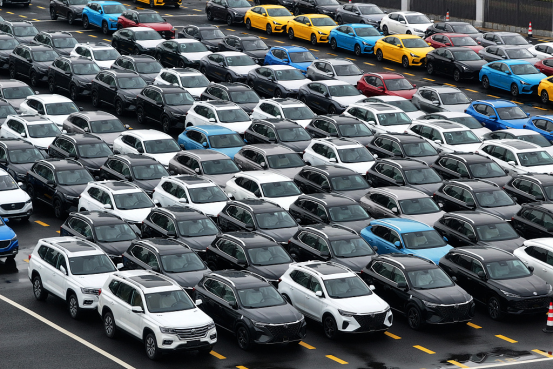SUN Yanhong: China's further reform and opening up creates new opportunities for China-Italy economic cooperation

Italian Prime Minister Giorgia Meloni giving a speech at a political party event, April 28, 2024. /CFP
Italian Prime Minister Giorgia Meloni is paying an official visit to China from July 27 to 31, 2024. This is Meloni's first visit to China since she took office as Prime Minister of Italy in 2022.
This year marks the 20th anniversary of the China-Italy comprehensive strategic partnership. Over the past two decades, driven by frequent visits between the two countries' high-level leaders, the issuance of three joint statements on comprehensive strategic partnership and the signing of three comprehensive cooperation action plans, the two countries' pragmatic cooperation has rapidly expanded in various directions, at multiple levels and in diverse fields, achieving fruitful results.
Meloni's visit to China is just after conclusion of the third plenary session of the 20th Communist Party of China (CPC) Central Committee, which adopted a resolution on further deepening reform comprehensively to advance Chinese modernization. The resolution made specific arrangements for comprehensively deepening reforms in multiple fields and promoting high-standard opening up.
China and Italy are highly complementary economically. The economic and trade exchanges over the past few decades have deeply integrated the interests of the two countries. In 2023, Italy was China's fourth-largest trading partner in the EU, and China was Italy's largest trading partner in Asia.
It's predictable that China's further deepening reform and opening up will create new space for China-Italy practical cooperation. In particular, in addition to potential greater growth of two-way trade, China-Italy two-way investment will also gain new impetus.

The Colosseum in Rome, Italy, October 24, 2011. /CFP
In terms of Italian investment in China, China's further opening up will create more opportunities for Italian enterprises in both manufacturing and service sectors.
According to the resolution, China will expand the catalog of encouraged industries for foreign investment, appropriately shorten the negative list for foreign investment, remove all market access restrictions in the manufacturing sector. Italy is the second largest manufacturing country in Europe. It is quite competitive in aerospace, automation, machinery, pharmaceuticals, home decoration, clothing and accessories, agricultural and food products, fitness equipment, ice and snow sports equipment, and ship building manufacturing. China's accelerated removal of restrictions on foreign investment in manufacturing is a major boon to Italian manufacturing companies.
In addition, China will promote opening up in the fields of telecommunications, internet, education, culture, and medical care. Italy has its own characteristics and competitiveness in service sectors such as medical care, elderly care, education, culture, etc., and related companies can come to China to look for business opportunities.
In particular, Italy is the country with the most aging population in Europe, and the development of the elderly care service is mature. As China's aging population problem is becoming prominent, the Chinese market can provide opportunities for Italian elderly care companies.
It is worth emphasizing that the imbalance of bilateral trade has long been a hot topic in China-Italy economic relations. In the future, more Italian service enterprises investing and operating in China will help to make up the imbalance of goods trade between the two countries through the channel of service trade. In addition, China's digital technology and digital economy have developed rapidly in recent years, and there is an abundant reserve of human resources in the digital field. In the future, China will continue to promote deep integration of real economy and digital economy, which will enable Italian enterprise investing in China to gain unique advantages in the digital transformation.

Lianyungang Port in Jiangsu Province to export new energy vehicles, China, July 16, 2024. /CFP
In terms of China's investment in Italy, although the Italian government has tightened its scrutiny of FDI from China in recent years, it welcomes greenfield investment from Chinese green industries such as new energy vehicles and new energy batteries, which will create opportunities for Chinese enterprises. According to Italian media, since the beginning of this year, the Ministry of Enterprises and Made in Italy has contacted several Chinese car makers such as Dongfeng and Chery, hoping to attract the latter to carry out greenfield investment in Italy to produce electric vehicles.
The minister Adolfo Urso, during his visit to China in early July, also focused on potential cooperation in the electric vehicle sector. In addition, in order to promote the electrification of the automotive industry, Italy must speed up the installation of public charging infrastructure. In this regard, Chinese companies can also provide technology, high-quality products and construction services.
At present, Italy's economic recovery is facing challenges, and China's economy is in a critical period of transition to high-quality development. The two countries will surely achieve mutual benefit and win-win results through overcoming geopolitical obstacles and further strengthening economic cooperation. It's expected that a series of cooperation agreements will be signed between China and Italy during Meloni's visit, which will undoubtedly give new impetus to the pragmatic cooperation between the two countries.
Sun Yanhong, Senior Research Fellow at the Institute of European Studies, Chinese Academy of Social Sciences (CASS).
The article was originally published in CGTN on July 29, 2024.
